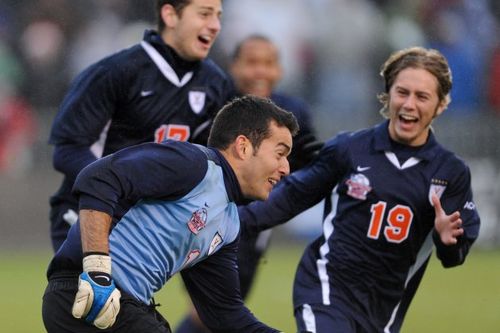No, there were no goals scored in regulation of Sunday's NCAA College Cup Final (won by Virginia over Akron in penalty kicks), and yes, there were only a combined three goals scored in the three College Cup games this past weekend, but this weekend's NCAA matches were still a success. Why? The matches helped provide a glimpse of a college game that is still producing good professional prospects and still serving as a useful stand-in for a proper pro player development system in the United States.
In an ideal world, the task of developing pro prospects would fall to Major League Soccer, but the league has only recently begun making any real progress in establishing the infrastructure for such a role. In the interim, and for decades now, college soccer has helped fill that role by giving young soccer players in this country an avenue to pursue the game and grow as players.
There are some who still don't realize just how invaluable the college game is to player development in this country, which is disappointing because without college soccer the current pool of American talent would be much more shallow and the pro game in this country wouldn't have made as many strides as it has enjoyed over the course of the past decade.
Even as MLS continues to grow, and the academy programs slowly but surely being put in place start to increase their role in developing talent, the college game will still be important in developing players. Why? Because the United States is just too large a country for 15 teams to cover with academies and even as some colleges cut their men's soccer programs, there are still plenty that are flourishing a doing an excellent job of helping young talents hone their game.
This was clear this past weekend as we caught a glimpse of the considerable amount of talent on display this past weekend. From Virginia's Tony Tchani to Akron's Teal Bunbury, to Wake Forest's Ike Opara and Corben, down to younger prospects such as Akron's Kofi Sarkodie, Virginia's Will Bates and Florida's Billy Schuler, the four teams competing in the College Cup showed us that a healthy number of quality pro prospects are continuing to be produced by the pro game.
We probably should have already figured that out considering what we saw from the 2009 MLS Rookie Class, which was one of the strongest in league history. When you also consider that European-based pros Marcus Tracy, Alejandro Bedoya and Mike Grella were also produced last year by the college game, you realize that, if anything, colleges are producing even more pro-ready talent than ever before.
The 2010 MLS Draft class will be hard-pressed to match last year's success, but the pool of talent is a strong one for a second straight year, especially if standout underclassmen Opara, Bone, Tchani and Bunbury leave school early.
Yes, the weekend's matches could have been better, and more attractive, but championship games can often be struggles between strong teams. What we still were able to see were good tactics, sharp passing, impressive defending and some individual talent that surely had MLS scouts excited about the prospects for another deep draft.
There may come a day when the college game is officially relegated to second-fiddle status in the professional player production business, but until that day comes, and until MLS teams have things in place to really produce players, American soccer fans should probably realize just how important college soccer is to the continued growth of the sport in this country.

